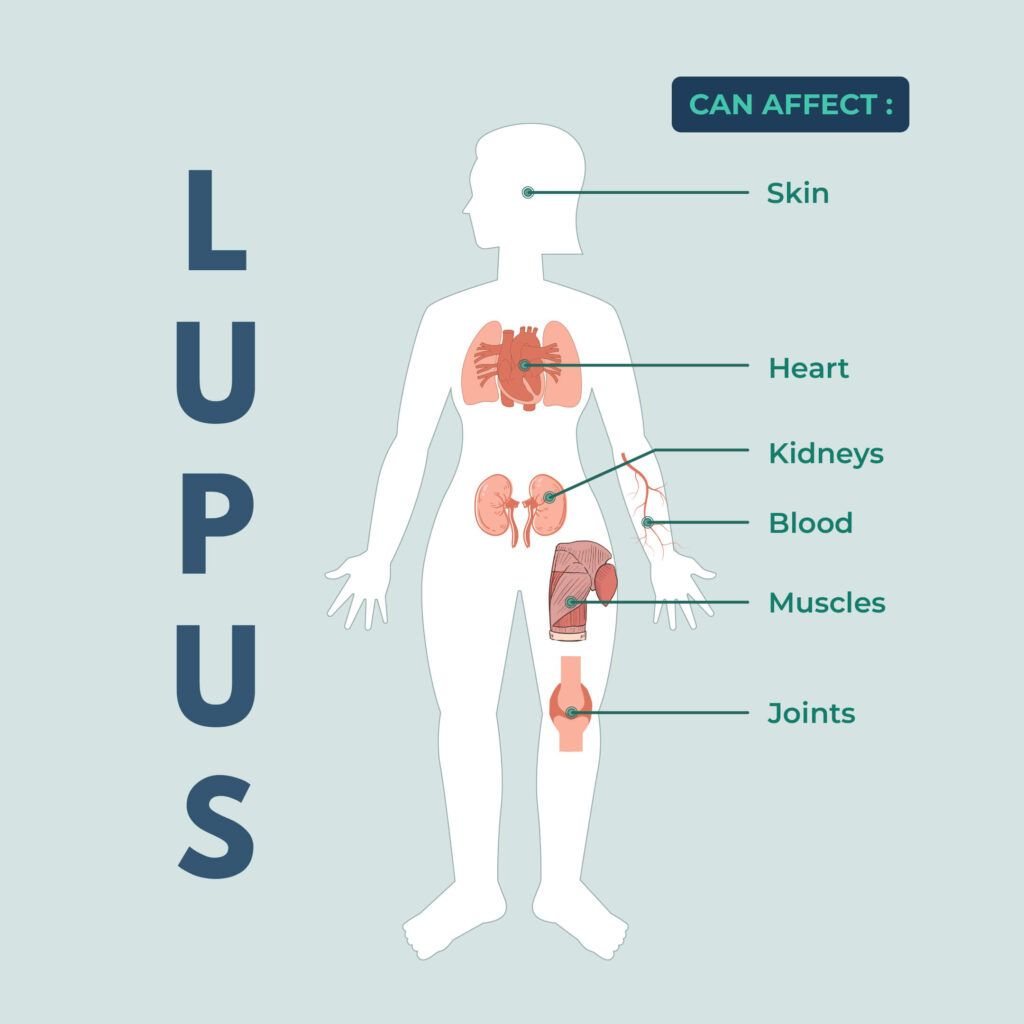While researchers suspect a combination of genes and environmental factors that trigger lupus, there's still no light on which one in particular sets the disease in motion. This article attempts to explore the genetic side of lupus and explains why even though lupus isn't a hereditary condition it is still seen running in families.
Lupus Disease: An Overview
Lupus is an autoimmune disease that causes chronic inflammation in the body, primarily in connective tissues like cartilage and the lining of blood vessels.
In autoimmune diseases, the immune system mistakes the healthy cells in your body as dangerous invaders and attacks them.
Lupus may affect other body systems, including the skin, joints, kidneys, brain, heart, and lungs.
Though the exact cause of this disease is unknown, this autoimmune disease is believed to occur due to genetics and the environment.
It has been observed that some people with a genetic tendency for lupus develop the condition on exposure to something in the environment that triggers the disease.
Lupus is more common in women between ages 15 and 45.
It is difficult to diagnose lupus as its signs and symptoms are similar to other conditions.
Is Lupus Hereditary? The Inheritance Pattern
No, lupus is not an inherited condition.
However, certain gene variants are associated with lupus risk.
People may inherit these gene variants, which may increase or decrease their risk for the condition.
It has been found that 20% of people with lupus have a parent or sibling with this condition.
Around 5% of children with a parent having lupus may develop the condition.
Genes Involved in Lupus
Though studies around the genetics of lupus are still underway, scientists have identified at least 60 genes that may increase an individual’s risk for systemic lupus erythematosus.
Studies have shown that a class of genes called the major histocompatibility complex (MHC) is associated with lupus.
These genes perform various functions in the body, including:
- Build immune system response to some infectious agents
- Create a protein that deals with the immune system’s inflammatory response
Lupus is polygenic - multiple gene variations contribute to the disease.
However, some single gene variations are also responsible for lupus.
The most common single gene mutation that causes lupus is complement deficiency.
Another monogenic cause of lupus is a mutation or abnormal change in the PRKCD gene.
This mutation results in the formation of excessive T cells and stimulates B-cells to convey improper signals to the immune system, triggering lupus symptoms.
Does Lupus Run In Families?
Lupus is often seen running in families as the gene changes that increase the risk of this condition can be inherited across generations.
What Are Some Triggers Of Lupus?
A few potential triggers of lupus include:
- Sunlight: Exposure to sunlight may trigger an internal response in susceptible individuals, giving rise to lupus skin lesions.
- Infections: Some infections can trigger lupus in some people or cause a relapse
- Drugs: A few medications, like those for blood pressure, seizures, and antibiotics, can trigger lupus. People who develop drug-induced lupus may get better after stopping the medication.
Signs And Symptoms Of Lupus
Signs and symptoms of lupus vary in every individual. They may develop slowly or come suddenly, may be mild or severe.
People with mild lupus usually have shorter episodes of symptoms, and these are called flares.
The most common symptoms of lupus are:
- A facial rash that looks like the wings of a butterfly on both cheeks
- Chronic fatigue
- Fever
- Skin rashes elsewhere in the body that may worsen on exposure to the sun
- Shortness of breath
- Chest pain
- Dry eyes
- Joint or muscle pain
- Mouth sores
- Headaches
Apart from these general symptoms of lupus, women of African-American or Hispanic origin may also experience kidney complications, osteoporosis, and heart disease.
Types of Lupus
While systemic lupus erythematosus (SLE) is the most common form of lupus, other types of this condition are:
- Cutaneous lupus erythematosus
This type of lupus affects the skin. Besides skin lesions and sensitivity to the sun, people with this type of lupus may also experience hair loss.
- Drug-induced lupus
This type of lupus is caused by some medications and may resolve once the medication is stopped.
People with drug-induced lupus may have other symptoms similar to systemic lupus erythematosus.
- Neonatal lupus
This rare type of lupus is found in infants at birth.
Children born with this type of lupus receive antibodies from their mothers who had lupus at the time of birth or may develop the condition later in life.
Other Risk Factors For Lupus
Factors that may increase an individual’s risk for lupus include:
- Gender: Lupus is more common in women
- Age: Though lupus can affect individuals of any age, it is mainly diagnosed between ages 15 and 45
- Race: Lupus is more common in African Americans, Hispanics, and Asian Americans
Is Lupus Hereditary?: Summary
- Lupus is an autoimmune disease that causes chronic inflammation in different parts of the body.
- Lupus is more common in women and people between ages 15 and 45.
- The exact cause of lupus is unknown, but a few factors, like sunlight exposure, infection, and drugs, can trigger the condition.
- Lupus symptoms vary between individuals, but a butterfly-shaped facial rash is characteristic of the disease.
- Women of African-American and Hispanic origin are at a greater risk for lupus.
- Systemic lupus erythematosus is the most common form of lupus.
- Though lupus runs in families, its inheritance pattern is unknown.
- The major histocompatibility complex (MHC) class of genes is known to be associated with lupus.






